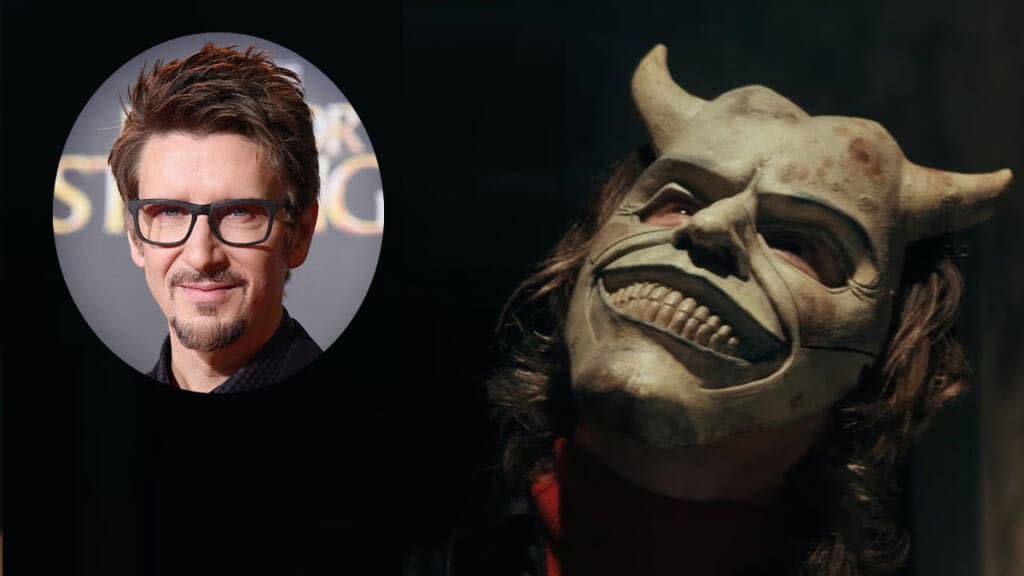Why ‘The Black Phone’ Is Scott Derrickson’s Most Personal Film — and His Favorite Yet

- Oops!Something went wrong.Please try again later.
- Oops!Something went wrong.Please try again later.
Six years after directing the Marvel blockbuster “Doctor Strange,” Scott Derrickson is returning to his roots with “The Black Phone,” an intimate, low-budget horror movie that hearkens back to his early work on “Sinister” and “The Exorcism of Emily Rose.” But more than getting the chance to play in the horror genre again, “The Black Phone” is a movie that Derrickson says grew out of three years of therapy, in which the director dove into “the traumatic nature of my own childhood” and “the violence” he experienced in his school, neighborhood and home.
Of course, all of his movies — even “Doctor Strange” — are in ways personal stories, but “The Black Phone” goes deeper than ever before.
“‘Doctor Strange’ is a personal movie. I think that it feels personal to me, and I don’t think anybody but me would have made that movie the way I made it,” he told TheWrap. “But this is a whole other level of personal. This is the most personal film I’ve ever made by far.”
Also Read:
Jason Blum Donates $10 Million to Alma Mater Vassar College
“The Black Phone” is based on a short story by Joe Hill about the Grabber (Ethan Hawke), a serial killer who abducts children in a van and locks them in an empty, soundproof basement for days or weeks before killing them. His latest victim is Finney (Mason Thames), a 13-year-old boy whose only solace inside the room is a disconnected telephone through which he’s mysteriously able to receive calls from the Grabber’s previous victims.
At a mere 30 pages and 7,250 words, Hill’s original story is a brief one. But Derrickson, along with screenwriter C. Robert Cargill, had the idea to fuse Hill’s horror story with Derrickson’s own emotional experience growing up in North Vancouver in 1978 when he was about the age of Penny (Madeleine McGraw), Finney’s flinty 12-year-old sister whose own supernatural gifts may help her locate her brother.
Derrickson went so far as to base many of the film’s characters off real life people he knew as a kid. Further focusing on the children and their tense upbringing with an alcoholic single father also helps ground “The Black Phone” alongside its more horrific and supernatural elements, elevating it beyond the short story.
Also Read:
‘The Black Phone’ Film Review: Stephen King–Flavored Retro Horror Delivers Solid Chills
“The whole idea was to take what that time felt like to me, which is very different than [Steven] Spielberg’s Amblin suburban middle school life,” Derrickson said. “I wanted it to feel authentic and real and feel like that time and place, at least the way that it felt to me.”
Even though a film like “The Black Phone” is not nearly on the scale of a massive blockbuster like “Doctor Strange,” the process of making the films are not as different as you would imagine. But Derrickson was glad to have the support of producer Jason Blum, who agreed to shift production so they could work around McGraw’s shooting schedule and gave Derrickson free reign to make the film as personal as it could be.
“You never have enough time and you never have enough money. ‘Sinister’ was $3 million. ‘Doctor Strange’ was over $200 million. Both of them were stressful because I needed more time and more money. That’s always the case,” Derrickson said. “But when you scale it down to something like this, and especially when you have a protective producer like Jason Blum, who supports me in whatever I want to do, then you have the ability to really control every element of production. The timing of everything can be as precise as you want it to be. Every scene is what you want it to be.”
Also Read:
Scott Derrickson to Direct Action Love Story ‘The Gorge’ for Skydance
In something of a coincidence, Derrickson’s “The Black Phone” opened within a month of “Doctor Strange in the Multiverse of Madness,” which Derrickson ultimately exited two years ago due to “creative differences.”
Derrickson discussed his exit from the Marvel sequel with TheWrap, acknowledging that the catch-all “creative differences” can mean “almost anything” and often creates a whole lot of rumors. But he maintains that “in this case, it was true,” that he amicably parted ways over real creative differences on the film and that his relationship with Kevin Feige and the Marvel team remains strong. He even added that he would work with Marvel again if given the opportunity.
“In this case, it was all meant to be, the fact that I stepped off of that was the right decision,” he said. “And the fact that I then went made the most personal movie of my career, and probably my favorite movie that I’ve made, is just more proof that it was a good choice.”
Also Read:
‘Malignant’ Director James Wan on Making an Intentionally Meme-Worthy Horror Movie

